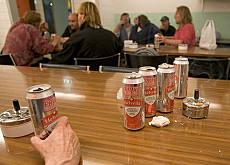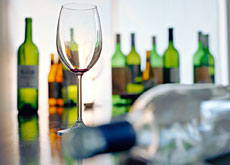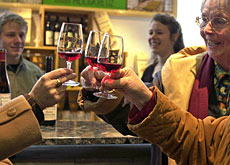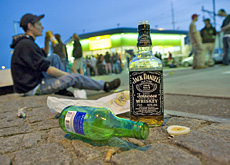Alcohol is a killer for Swiss

Alcohol is a major cause of death – in many cases premature - among the population in Switzerland, according to a study.
Alcohol consumption led to 3,500 deaths in 2002, with men twice as likely as women to be affected.
The study, carried out by Zurich University’s institute for health and addiction research for the Federal Heath Office, shows that alcohol is responsible for 5.2 per cent of all deaths among men, and 1.4 per cent among women.
Alcohol also accounts for a large number of premature deaths. Drinking is estimated to reduce men’s life expectancy, which is currently 78.7 years, by more than one tenth and women’s by half as much.
If the number of people whose wellbeing is affected by alcohol is taken into consideration, drinking is one of the top five health risk factors in Switzerland leading to a series of diseases and handicaps. The researchers were able to show that more than 60 illnesses were linked to alcohol consumption.
They cite previous studies from Lyon’s international cancer research centre that classify alcohol as a cancerous substance. Drinking could increase the likelihood of developing certain types of cancer such as liver, bowel or oesophagus.
Work on breast cancer has shown, for example, that drinking the equivalent of just one glass of alcohol per day increases the risk of getting the disease.
The study’s authors suggested increasing taxes on alcohol as one possible remedy to the problem, as well as banning or limiting sales of alcoholic beverages to youngsters at certain events.
Information campaigns
“More can always be done,” Janine Messerli from the Institute for the Prevention of Alcohol and Drug Problems told swissinfo.
“Measures which are really important and effective are political and structural, such as making access to alcoholic beverages not too easy. This means for instance opening hours for shops – so you can’t buy alcohol anytime anywhere. This has a great influence on consumption and problematic consumption,” she said.
“Also prices should not be too low because prices are related to the rate of consumption and problematic consumption.”
Messerli added that another central measure is a better application of the laws concerning the sale of alcoholic beverages to young people. The national law is that spirits may not be sold to those under 18 and beer and wine to those under 16.
“The problem is that a third of 15-year-olds manage to buy alcoholic drinks,” she said.
“But what is lacking from our point of view is information campaigns about the risks of alcohol consumption. You have to communicate the risks – in addition to the political measures such as price and access – to have effective alcohol prevention.”
Cause of accidents
The Zurich researchers pointed out that drinking can often lead to death when it causes liver disease, and that it also severely increases the likelihood of an accident.
But they warned that the effects of occasional binge drinking on people’s health were still underestimated, especially for those at risk from cardiovascular disease.
The study’s authors said they were also concerned by the high number of problems related to alcohol despite there being a series of efficient measures available to cut down on drinking-related diseases and accidents.
They pointed out that unlike neighbours France and Italy, Switzerland has failed to substantially reduce adult consumption.
The researchers also called for more efficient treatment for people suffering from alcoholism.
swissinfo with agencies
Based on 2002 figures, the death rate in Switzerland directly linked to alcohol abuse (2.7%) is close or equal to the European Union average.
In Britain, the rate was 1.4 per cent, while in Sweden it was 3.5 per cent at the same time. Slovenia has the worst record with a rate of 6.4, ahead of Germany with five.
In the United States, the death rate related to alcohol-induced causes was close to seven per cent in 2002, with men registering 11 per cent.
In 2002, 15.9% of the Swiss population drank some alcohol every day, but more than one fifth never drinks any.
On average, 7.5% per cent of men and 4.6% of women drink regularly.
It is estimated that 4.1% of men and 4.6% take an average health risk by consuming alcohol.
But 3.4% of men and 0.9% of women take a high risk.

In compliance with the JTI standards
More: SWI swissinfo.ch certified by the Journalism Trust Initiative



You can find an overview of ongoing debates with our journalists here. Please join us!
If you want to start a conversation about a topic raised in this article or want to report factual errors, email us at english@swissinfo.ch.